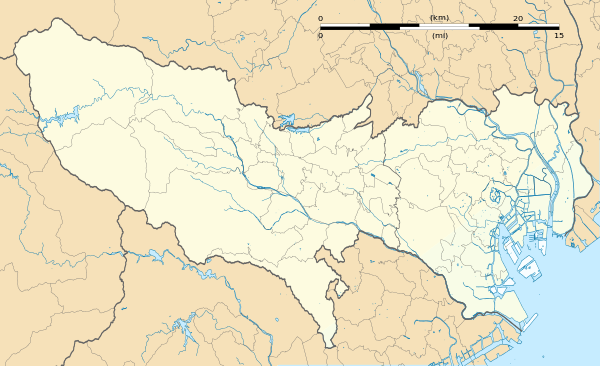Tama Station
Tama Station (多磨駅, Tama-eki) is a railway station the Seibu Tamagawa Line in Fuchū, Tokyo, Japan, operated by the private railway operator Seibu Railway.
SW03 Tama Station 多磨駅 | |
|---|---|
Tama Station platforms in October 2008 | |
| Location | 3-42-2 Koyogaoka, Fuchū-shi, Tokyo Japan |
| Coordinates | 35.6766°N 139.5171°E |
| Operated by | |
| Line(s) | |
| Distance | 4.1 km from Musashi-Sakai |
| Platforms | 2 side platforms |
| Tracks | 2 |
| Other information | |
| Station code | SW03 |
| History | |
| Opened | 5 January 1929 |
| Previous names | Tama-Bochi-mae |
| Traffic | |
| Passengers (FY2014) | 13,460 daily |
| Location | |
 SW03 Tama Station Location within Tokyo  SW03 Tama Station SW03 Tama Station (Japan) | |
Lines
Tama Station is served by the Seibu Tamagawa Line, and is 4.1 kilometers from the starting point of the line at Musashi-Sakai.
Station layout
The station has two side platforms serving two tracks, connected by a level crossing.
History
The station opened on January 5, 1929, as Tama-Bochi-mae Station (多磨墓地前駅), and was renamed Tama Station in 2001. The present station building has existed since 1988.[1][2] The station has the secondary name Tōkyō Gaidai-mae (東京外大前).[3]
Station numbering was introduced on all Seibu Railway lines during fiscal 2012, with Tama Station becoming "SW03".[4]
Passenger statistics
In fiscal 2014, the station was the 61st busiest on the Seibu network with an average of 13,460 passengers daily.[5] The passenger figures for previous years are as shown below.
| Fiscal year | Daily average |
|---|---|
| 2009 | 12,830[6] |
| 2010 | 12,873[7] |
| 2011 | 12,401[8] |
| 2012 | 12,475[9] |
| 2013 | 12,830[9] |
Surrounding area
- Tama Cemetery
- Tokyo Racecourse
- Tokyo University of Foreign Studies
- National Police Academy
- Ajinomoto Stadium
- American School in Japan
See also
References
- 駅一覧 [List of stations] (PDF) (in Japanese). Archived from the original (PDF) on 3 September 2014. Retrieved 28 August 2014.
- 年譜 [Chronological Record] (PDF) (in Japanese). Japan: Seibu Railway. Archived from the original (PDF) on 3 September 2014. Retrieved 28 August 2014.
- 多磨駅 [Tama Station] (pdf) (in Japanese). Japan: Seibu Railway. Retrieved 28 August 2014.
- 西武線全駅で駅ナンバリングを導入します [Station numbering to be introduced at all Seibu stations] (PDF). News Release (in Japanese). Japan: Seibu Railway. February 23, 2012. Archived from the original (PDF) on 24 September 2015. Retrieved 28 August 2014.
- 駅別乗降人員 2014(平成25)年度 1日平均 [Average daily station usage figures (fiscal 2014)] (PDF) (in Japanese). Japan: Seibu Railway. Archived from the original (PDF) on 8 March 2016. Retrieved 6 April 2016.
- 駅別乗降人員 2009(平成21)年度 1日平均 [Average daily station usage figures (fiscal 2009)] (PDF) (in Japanese). Japan: Seibu Railway. Archived from the original (PDF) on 24 September 2015. Retrieved 28 August 2014.
- 駅別乗降人員 2010(平成22)年度 1日平均 [Average daily station usage figures (fiscal 2010)] (PDF) (in Japanese). Japan: Seibu Railway. Archived from the original (PDF) on 26 June 2011. Retrieved 28 August 2014.
- 駅別乗降人員 2011(平成23)年度 1日平均 [Average daily station usage figures (fiscal 2011)] (PDF) (in Japanese). Japan: Seibu Railway. Archived from the original (PDF) on 1 November 2012. Retrieved 28 August 2014.
- 駅別乗降人員 2013(平成25)年度 1日平均 [Average daily station usage figures (fiscal 2013)] (PDF) (in Japanese). Japan: Seibu Railway. Archived from the original (PDF) on 14 July 2014. Retrieved 28 August 2014.